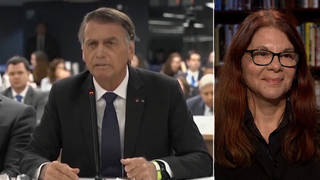
Topics
Guests
- Ro KhannaDemocratic congressmember from California and a member of the House Armed Services Committee.
“You can’t, as the president, engage in strikes on a foreign country when there’s no imminent threat, without coming to Congress for authorization,” says Ro Khanna, Democratic congressmember and member of the House Armed Services Committee, criticizing President Trump’s decision to bomb Iran’s nuclear sites as “blatantly unconstitutional” and a clear instance of executive overreach. Khanna and Republican Congressmember Thomas Massie recently introduced a bipartisan Iran War Powers Resolution in a bid to prevent further U.S. involvement in the Iran-Israel conflict. Khanna shares how antiwar voices in U.S. politics are too often silenced by powerful and wealthy interest groups, and urges the Democratic Party to harness widespread antiwar sentiment in opposition to Trump’s increasingly authoritarian foreign policy.
Transcript
AMY GOODMAN: This is Democracy Now!, democracynow.org, The War and Peace Report. I’m Amy Goodman, with Juan González.
Just hours after a fragile ceasefire between Israel and Iran begins, President Trump criticized both countries this morning, explicitly saying he’s not happy with Israel. This all comes two days after Trump ordered U.S. attacks on three Iranian nuclear sites without seeking congressional approval. We turn now to look at the role Congress plays in starting wars.
For more on this question, we’re joined by Democratic Congressmember Ro Khanna, member of the House Armed Services Committee. Last week, he introduced a bipartisan Iran War Powers Resolution with Republican Congressmember Thomas Massie in a bid to prevent U.S. involvement in the Iran-Israel conflict and reassert that any U.S. military action against Iran must be authorized by Congress. We want to start by asking Congressmember Khanna to respond to Defense Secretary Pete Hegseth in a press conference talking about the Trump administration fulfilling the notification requirements of the War Powers Act by notifying Congress immediately after.
DEFENSE SECRETARY PETE HEGSETH: They were notified after the planes were safely out. We complied with the notification requirements of the War Powers Act.
REPORTER: After the attacks, they were notified.
DEFENSE SECRETARY PETE HEGSETH: They were, immediately thereafter.
AMY GOODMAN: Well, for more, Congressmember Ro Khanna joins us from the Cannon Rotunda in D.C., deputy whip of the Congressional Progressive Caucus, member of the House Armed Services Committee. Last night, I watched an hour-and-a-half Q&A that was a MoveOn.org event titled “Fund Healthcare, Not Warfare.” Ro Khanna was the main guest.
Congressmember Khanna, respond to what Hegseth is saying and what you are demanding.
REP. RO KHANNA: Well, he’s just violating the Constitution. You can’t, as the president, engage in strikes on a foreign country when there’s no imminent threat, without coming to Congress for authorization. In this case, the missile strikes were characterized as a war on Iran. That was how it was as characterized in papers across our country. That’s how the Iranian people felt it. And that’s why Representative Massie and I introduced the bipartisan War Powers Resolution.
Now, the good thing is, I think, actually, President Trump paid attention. He saw that there was a lot of revolt within his own MAGA base, people like Marjorie Taylor Greene, Steve Bannon, Tucker Carlson speaking out, and he has gotten a ceasefire. Now, the key is: Is he going to make sure that the ceasefire holds? And is he actually going to engage in the kind of negotiation that President Obama engaged in to make sure that Iran doesn’t develop a nuclear weapon? The danger is, Iran is just going to learn the lesson of Pakistan and North Korea and take their nuclear program in a covert direction.
JUAN GONZÁLEZ: And, Congressman, how do you react to some of your colleagues, your Republican colleagues, who say the Democrats are crying now, but when Democrats engaged in bombings without seeking congressional approval, they were silent, specifically, for instance, some of the bombings that President Obama did in Yemen, the attacks on Libya and other countries?
REP. RO KHANNA: Well, frankly, they’re right. I mean, the Libya attacks were blatantly unconstitutional. Those strikes were also counterproductive. They incentivized countries to say, “If you voluntarily agree to give up your nuclear program, the United States may still attack you.” And the attacks on Yemen were unconstitutional. Bernie Sanders and I passed the first War Powers Resolution to stop the refueling of Saudi planes. So, I have been consistent, as have a few of us, speaking out against unconstitutional strikes, whether they’re Democratic or Republican presidents.
The question for the Democratic Party is: Are we going to take the mantle of being the antiwar party? That’s not pacifism. That means against these wars of choice. The American people are desperate for that. The antiwar candidate has usually won. And Trump outflanked us in 2016 and 2024 on an antiwar platform. I am pushing my party to be very clear that we will stand against these overseas wars of choice.
JUAN GONZÁLEZ: And could you explain what the 1973 War Powers Resolution calls for?
REP. RO KHANNA: Well, there are two different issues. One is the Constitution itself. And the Constitution says that before you strike another country and declare war, you need to come to Congress. The War Powers Resolution says that if there is a hostility that the president has initiated, he needs to notify Congress, and then Congress can vote to stop that hostility. So, it is a check that Congress has when the president acts in a way that defies congressional authorization.
But what we should have in this country is not the need to use a War Powers Resolution. What we should have in this country is the president coming to Congress before they want to strike another country. And in many cases, they may actually get the authorization. Here, Donald Trump didn’t want to come to Congress because he knew that at least one-third of his own MAGA base was opposed to the strikes and would have debated and argued against it.
AMY GOODMAN: So, you are co-sponsoring this resolution with the Republican Congressmember Massie. Trump, Trump aides have launched a new super PAC devoted to defeating Massie in his 2026 election. The new PAC, called Kentucky MAGA, will be run by two of Trump’s top political lieutenants, his former co-campaign manager Chris LaCivita and longtime pollster Tony Fabrizio. Can you respond and also take this larger to the issue of super PACs that you have long taken on, rejecting super PAC money in your own campaign? And do you think the weapons industry are long profiting from these super PACs?
REP. RO KHANNA: The biggest problem in American democracy is the role of big money. It has skewed our foreign policy into bloated defense budgets. It’s skewed our foreign policy in the Middle East. It has prevented us from getting Medicare for All. It has prevented us from taking on Big Pharma and lowering prescription drug prices. It has prevented us from getting rid of fossil fuel subsidies. It is why I don’t take any PAC money. It’s why Summer Lee and I have a bill to outlaw super PACs, that still would be constitutional under Citizens United. If you can regulate the amount of money that someone can give to a candidate, why can’t you regulate the amount of money someone can give to a super PAC?
And what Donald Trump is doing to Thomas Massie is unconscionable. Thomas Massie is actually a profile in courage. I believe him speaking up in our War Powers Resolution helped put pressure on Donald Trump to not escalate this war further and to get a ceasefire. And the reason that Donald Trump is targeting Thomas Massie is not just vindictiveness. When he’s vindictive, he’ll tweet out, he may encourage a primary challenge. Here, he’s putting his entire apparatus, his top political operatives in a super PAC against Massie, because he knew that other Republicans were thinking of joining that War Powers Resolution. He knew that he was bleeding his base, and he wanted to send a clear message, a chilling effect to the Congress, not to do what Massie did.
Massie got under his skin, and I’m glad that some of the Republicans spoke out so we’re not escalating the war. But it is just a perversion of democracy to see these super PACs. They took out my friend Jamaal Bowman, and they threaten members of Congress in undemocratic ways.
JUAN GONZÁLEZ: And, Congressman, I wanted to ask you — all of this expanding hostilities in the Middle East come in the midst of Congress grappling with what to do about the so-called One Big Beautiful Bill, the budget bill of the — signature budget bill of the Trump administration. What’s your sense of the impact of this continuing problems internationally on where this bill is going?
REP. RO KHANNA: The bill is a betrayal of Trump to his base. I mean, Trump promised, “No more money on wars overseas, and I’m going to help support and fund the working and middle class.” Instead, what is he doing? He’s increasing the defense budget by $150 billion. He’s spending billions of dollars on this war in Iran. And he’s literally ripping healthcare, Medicaid, food assistance away from the working and middle class, many of them his voters.
At the same time, he’s giving a total handout to technology companies by banning states, all 50 states, from having any AI regulation for 10 years. This will mean no state could have regulations to protect truck drivers. It would mean no states could have regulations to protect workers against AI surveillance. No state could have regulations to protect kids against algorithmic addiction. It is a terrible bill: tax breaks for the billionaires, handouts to corporations, huge defense increases, and hurting the working and middle class, ripping away their healthcare and their food assistance.
AMY GOODMAN: I want to play a voice from Gaza, Ro. Why not a ceasefire there? Al Jazeera is reporting that Palestinians are saying, “If you’re going to have a ceasefire between Israel and Iran, what about extending that to Gaza?” This is a Palestinian man named Khalil Moshbeh, speaking from Khan Younis.
KHALIL MOSHBEH: [translated] Whoever stopped the war between Iran and Israel is able to stop the war which has been going on for almost three years in the Gaza Strip — massacres every day, killing of children, killing the elderly, destruction of infrastructure, destruction of education, destruction of healthcare, destruction of everything we own in the Gaza Strip.
AMY GOODMAN: In fact, many say, Ro Khanna, that Netanyahu launched this war on Iran to divert attention from the catastrophe that is Gaza right now. What about a ceasefire there? And how can you force that in Congress?
REP. RO KHANNA: The report is heart-wrenching. Every time I hear about Gaza, about the over 55,000 killed, many women and children, the over 130,000 wounded, the 600,000 students who have not been able to go to school for years, the 400,000 starving, I think what a stain on the conscience, not just of our nation, but the world. It is why I voted against the offensive funding to Netanyahu almost seven months ago.
Now, look, I was encouraged that President Trump this morning finally said no to Netanyahu on bombing in Iran. But he needs to say no to Netanyahu in continuing the bombing in Gaza. He has authorized $14 billion of sales and transfers since he’s been president. He can simply say to Netanyahu, “Stop,” and then we can convene the Palestinians, Egypt, Jordan, Saudi Arabia, UAE and Israel to have a solution in Palestine that does not involve Hamas, that involves the civil voices in Palestine, and finally have a Palestinian state.
But the question is whether Trump is going to stand up to Netanyahu’s bombing in Gaza, stand up, really, to Smotrich and Ben-Gvir, who are pushing Netanyahu to continue this. And I really hope that he will, and the Congress can say, “We don’t want to continue to fund it.”
AMY GOODMAN: Thank you very much for joining us, Congressmember Ro Khanna, Democratic congressmember from Silicon Valley in California, introduced a bipartisan Iran War Powers Resolution.
Happy birthday to Karen Ranucci! I’m Amy Goodman, with Juan González.












Media Options